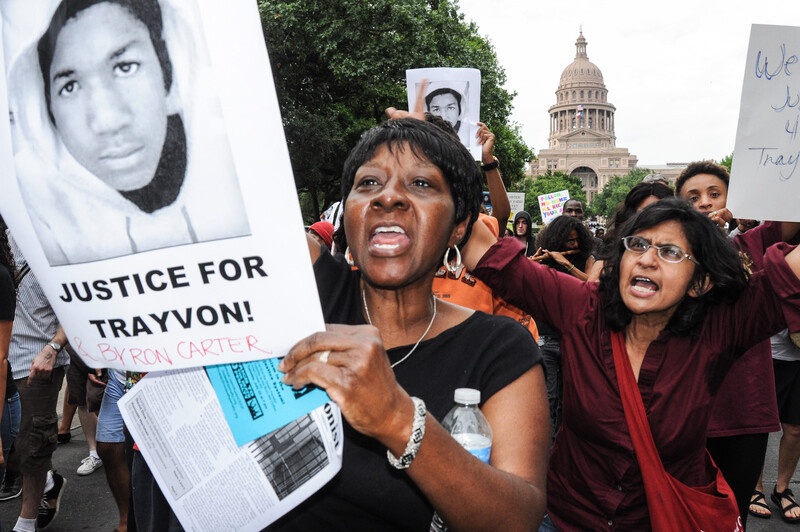15 August 2013

Across the US, communities demand justice for Trayvon Martin and other victims of racist violence.
Wikimedia CommonsIn July, a jury in Florida found George Zimmerman not guilty of murdering Trayvon Martin, an African American teenager whom Zimmerman racially profiled, stalked and ultimately shot and killed at point-blank range in February 2012.
As Glen Ford, executive editor of the Black Agenda Report noted earlier this month,
The broad masses of Black people see clearly — with horror — that the system, itself, has spoken, and that the verdict reflects the unreconstructed worldview of white America, two-thirds of whom view Trayvon Martin’s killing as justifiable — which means, quite simply, that any Black life can justifiably be taken.
Outraged by the acquittal of George Zimmerman, as many in the US and around the world are, the US Northwest Campus Boycott, Divestment and Sanctions Coalition has drafted a letter demanding that those involved in Palestine solidarity work continue to challenge racism in our local communities and organizing circles.
Personally, I was proud to add my signature to the letter, joining many other individuals and dozens of organizations including student Palestine solidarity groups, civil rights and human rights organizations, and activist campaigns working for justice and equality.
“Call to action”
Wael Elasady, co-founder of Students United for Palestinian Equal Rights at Portland State University in Oregon, told me via email that the coalition members were “outraged by the verdict and felt it was important to take a stand against this injustice … We wanted this statement to be a call to action to all those involved in Palestine Solidarity work to participate in whatever ways they can in the fight for racial justice.”
He added,
We know that US support for Israel which is justified through racist stereotypes of Muslims and Arabs cannot be challenged if we do not at the same time challenge the festering anti-black racism here at home.
Of course we aren’t the first to realize this connection; there exists a history of solidarity between the Palestinian struggle and the black liberation struggle from the Civil Rights Movement to the South African Anti-apartheid struggle — where the present-day Palestinian call for boycott divestment and sanctions takes much of its inspiration.
We think we need to rediscover that history and build on that solidarity between people suffering under oppression, whether here or abroad.
The coalition is encouraging supporters to sign the NAACP statement to the US Department of Justice demanding they open a civil rights case against George Zimmerman. In addition, supporters are urged to take part in local rallies and demonstrations on 24 August for the 50th anniversary of the historic March on Washington.
The entire letter is below, and was posted on Wednesday to the Students for Justice in Palestine-National website. A full list of signatories is included there.
In light of the recent acquittal of George Zimmerman, Students for Justice in Palestine (SJP), Students United for Palestinian Equal Rights (SUPER), and other organizations that work to secure the rights of the Palestinian people take a firm position against the racist institutions and laws that allowed for the murderer of an unarmed teenager to walk free. SJP and SUPER are in solidarity with Trayvon Martin’s family and loved ones, and with all victims of racist violence, as well as with the thousands of people who are working for racial justice in the US.
This trial highlights yet again that we do not live in a post-racial society, nor is our justice system colorblind. As Syreeta McFadden put it, “Only in America can a dead black boy go on trial for his own murder.” Through an appeal to racist stereotypes and character assassination, Trayvon was unjustly criminalized, much like thousands of black youth, women, men, and trans* people in this country are everyday.
As people who are fighting for justice in Palestine, we understand how racism is used to justify and perpetuate an unjust system that oppresses whole populations. Our government tries to divide us by telling us that black is synonymous with “criminal” in the same way that it tries to tell us that Arab and Muslim is synonymous with “terrorist.”
In many ways the black struggle coincides with the Palestinian struggle, from racial profiling, to youth incarcerations, to segregated roads, buses, housing, and education. On top of this, a handful of the same corporations, like G4S and other prison industries are profiting off of the racist mass imprisonment of both African Americans in the US and Palestinians in the Occupied Territories.
We understand that racism did not end with the abolition of slavery, nor did it end with the defeat of Jim Crow, and as people who are fighting to end US support for the racist system of Israeli apartheid, we know that this struggle cannot move forward without challenging racism here at home. We also must address racism within our own organizing spaces and college and universities.
Advocating for human rights is incomplete without challenging institutional racism in the university. SJP and SUPER are in solidarity with the victims of racist injustice here at home and those struggling to end it, because we know that “La union hace la fuerza” (With unity there is strength).
With this statement, we ask all those who are committed to the struggle for Palestine and who are committed to ending US complicity with racist and colonial regimes abroad to take a position against the racism and injustice that is perpetrated at home by our same government.
We encourage all those who are fighting for justice in Palestine to sign the NAACP statement calling for the US Department of Justice to file civil rights charges against Mr. Zimmerman. We also encourage all to mobilize for protests and other events in solidarity with Trayvon Martin and against racism, such as the upcoming national 50th anniversary of the March on Washington on August 24 in Washington DC and local solidarity protests that will take place on this day.





